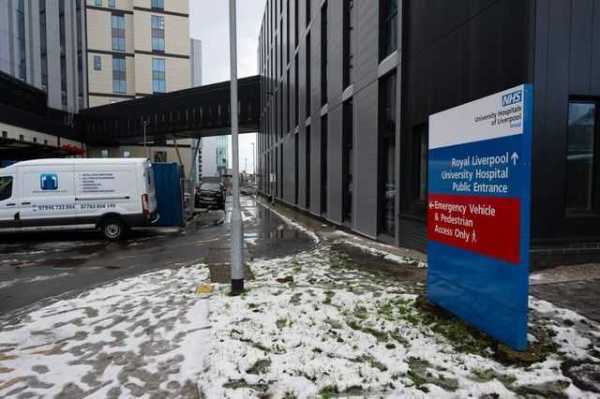
A surge in winter viruses have forced eight UK to declare critical incidents – with an unusually high number of infectious patients needing isolation and treatment.
It comes after shocking figures revealed cases of the had , as patients struck down with the illness continue to take over hundreds of beds across the country. Hospitals struggling to meet the demands were today forced to turn their patients away, urging sick people to visit their GPs or call 111 instead.
Flu symptoms include breathing difficulties, chest pain and dehydration, which for many vulnerable Brits, would require hospital treatment. Last week, a UK hospital declared a critical incident after an overwhelming number of sick patients arrived needing care.
READ MORE:
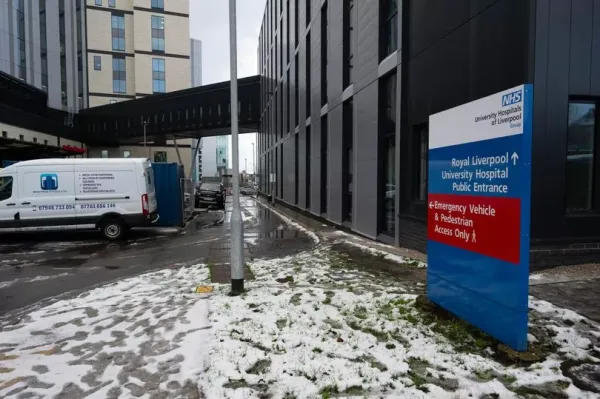
stressed there had been a "sharp rise in winter viruses" while officials urged people to avoid the hospital as they tackled staffing levels and "significant pressure". Ed Cetti, Chief Medical Officer at Surrey and Sussex Healthcare NHS Trust said: "Due to high levels of demand and a sharp increase in winter viruses which is impacting staffing levels and how we move patients around our site, our services are under significant pressure."
Surrey and Sussex NHS Trust declared the critical incident on Thursday, standing it down three days later. Today, hospitals in four different NHS Trusts are facing the same extreme pressures, including one that welcomes more than 300 patients in one day. Here's the full list:
Liverpool Royal Hospital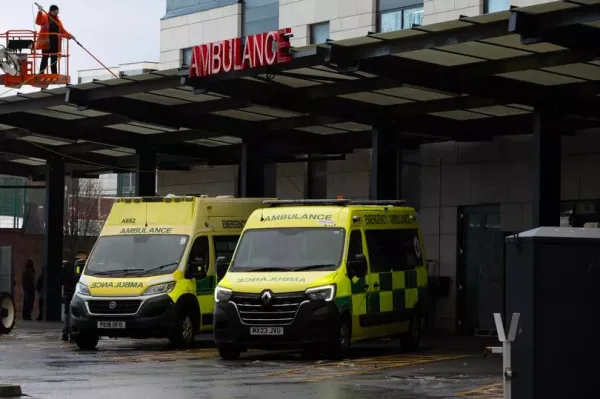
Liverpool Royal Hospital have reported "exceptionally high" since Tuesday morning, causing it to , and warn patients to stay away unless it is an emergency. The hospital told patients to visit their GPs or call 111 amid high numbers visiting its A&E department, unless it is a medical emergency.
The warning comes just a day after the hospital declared a 'full capacity' emergency on Monday after some patients were found to waited as long as 91 hours in A&E before being treated. A critical incident is implemented when the level of disruption results in the organisation losing its ability to deliver critical services, Liverpool Echo reported.
A spokesperson for the University Hospitals of Liverpool Group, which oversees the running of the Royal, said: “Given the exceptionally high demands on our emergency department, especially with flu and respiratory illnesses, and the number of patients we have taken this action to support the safe care and treatment of our patients, which is our absolute priority.
“We have a comprehensive plan in place and are taking all the necessary actions to manage the challenging circumstances facing patients and colleagues currently. We are working with partner organisations to ensure those that are medically fit can leave hospital safely and at the earliest opportunity.
“Colleagues are working incredibly hard to treat people as quickly as possible, however some people will experience longer waits while we treat our sickest patients. If it is not a medical emergency please consider using other services, such as your GP, local pharmacy or walk-in centre. The NHS 111 service can be used to help identify the most appropriate service for you and help avoid long waits."
Hampshire Hospitals NHS Foundation Trust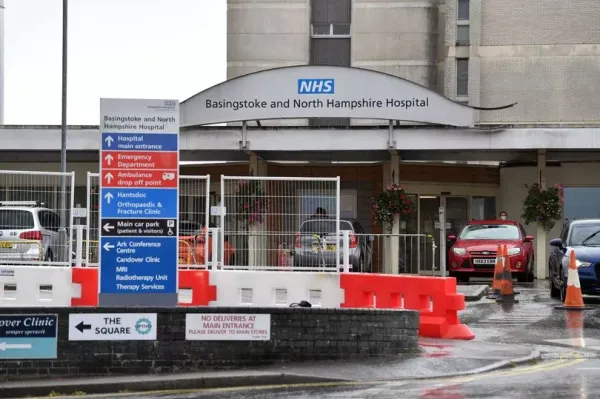
A critical incident has been declared at both Royal Hampshire County Hospital in Winchester and Basingstoke and North Hampshire Hospital on Tuesday morning due to a high admission rate, a high number of infectious patients requiring isolation, and a low discharge rate.
The hospitals say there has been an "unusually high" level of winter viruses since the turn of the year. As part of its critical incident response, the Trust is looking to discharge patients who no longer require acute care and limit the number who need admission at its Basingstoke and Winchester sites. People have been urged to only attend the emergency department for a life-threatening illness or injury and by collecting friends or loved ones ready for discharge at the earliest opportunity.
Julie Dawes, chief nurse for Hampshire , said: "Our ward teams can help with medication or equipment so if you can, please have the conversation and collect loved ones. This will free up capacity for someone who in need of hospital treatment and care. Anyone suffering from a winter virus is advised to stay at home and rest, drink plenty of fluids, and use over-the-counter medication such as paracetamol or ibuprofen to assist with managing symptoms.”
A statement added: "This morning, Hampshire Hospitals NHS Foundation Trust declared a critical incident due to sustained pressures at our Basingstoke and Winchester hospitals. These include a high admission rate, a high number of infectious patients requiring isolation, and a low discharge rate. This decision has not been taken lightly. However, beds across both hospitals are full and attendance at our emergency departments is extremely high, which means there is currently no capacity to admit further patients needing our care.
"Attending our emergency departments for non-life-threatening conditions will mean an extremely long wait. If you need medical assistance, please speak to NHS 111, your GP, pharmacy, or urgent treatment centre."
Derriford Hospital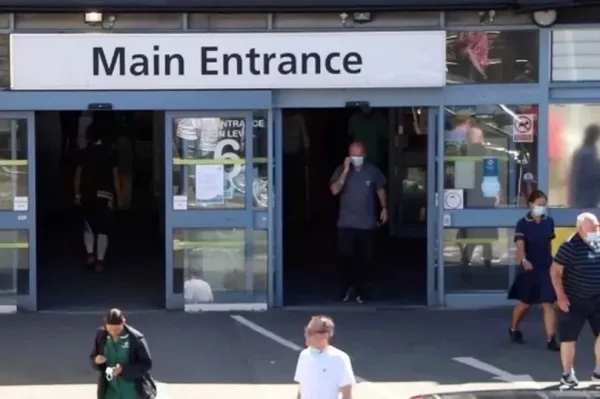
Derriford Hospital has declared a critical incident after seeing more than 300 patients in one day. Staff at the site in Devon are facing extreme pressure due to an influx of patients at the start of the week.
On Monday, the site welcomed more than 300 patients, with more than 200 being admitted as inpatients. The hospital has since urged people to only attend if they are in serious condition. University Hospitals Plymouth NHS Trust confirmed a high number of older patients struggled with respiratory issues at Derriford Hospital this week.
Derriford Hospital said: "Our colleagues are working hard to prioritise patients based on their clinical need and move patients to the right place for them as soon as possible. If you have a very serious or life-threatening emergency, we are here for you, but otherwise, if you need urgent care, we ask you please to call NHS 111 or use NHS 111 online."
Darryn Allcorn, chief nurse at University Plymouth NHS Trust, stressed that the "sickest patients" must be "prioritised". He said: "Our Emergency Department is there for life-threatening conditions and real emergencies. If you can use other services, such as NHS 111, pharmacy or your GP, please do so.
"If you do come to the Emergency Department and it is not an emergency or a life-threatening condition, then you may be redirected. It’s really important we make sure that the sickest patients are prioritised and that we keep our services flowing for those who are in greatest need."
He added: "Therefore, we ask that at this time unless you are a carer or if the patient who is coming to the hospital is particularly distressed, that those who accompany patients do not to come into the Emergency Department. We need the seating spaces for patients to sit down and be comfortable. We ask that patients, visitors and families be kind to one another and continue to treat staff with respect during this extremely busy period.”
University Hospitals Birmingham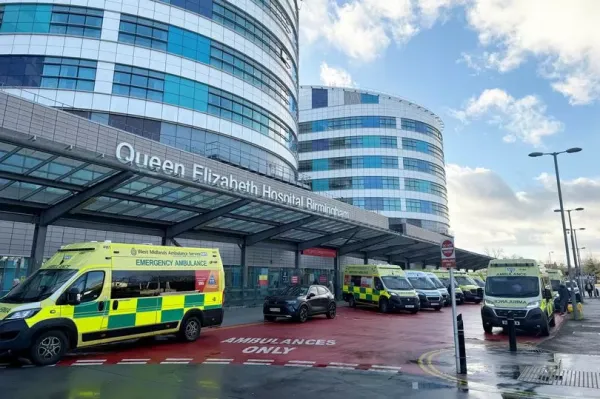
A critical incident has been declared by University Hospitals Birmingham due an "exceptional number" of flu positive patients presenting in the first week of January and requiring admission, which has now impacted 311 inpatients, the NHS trust said. It runs four hospitals, including Heartlands in Bordesley Green, the Queen Elizabeth in Edgbaston, Good Hope in Sutton Coldfield and Solihull.
Staff have introduced mask-wearing across its departments as they attempt to tackle the growing pressure. Chief nurse Margaret Garbett, said: "Despite expanding capacity in our wards and in our emergency departments, A&E remains overcrowded with extended waits to be seen. We are asking the communities we serve to think carefully about how they access healthcare."
Nurse Garbett urged those with the public to use alternative services, including a pharmacy or calling 111, unless they were dealing with an emergency or life-threatening condition. University Hospitals Birmingham is one of the largest NHS trusts in England, welcoming more than 2.2 million patients every year.